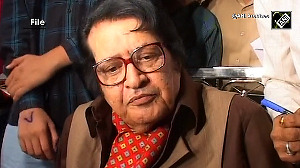Jagson Airlines, soon to diversify into a low-cost domestic airline, is in talks with two European institutional investors to infuse Rs 120 crore (Rs 1.2 billion) for funding its Rs 1,800 crore (Rs 18 billion) expansion plans.
The private carrier, which is a part of New Delhi-based oil company the Jagson group, is also planning to dilute 20-25 per cent stake through a rights issue based on the valuation in 2007.
"The airline is all set to hit the Indian skies with a difference by April this year. The promoters are expected to infuse Rs 32 crore (Rs 320 million) more by then," Jagson Airlines president and CEO Uttam Kumar Bose said.
The private airline would initially invest Rs 250 crore (Rs 2.5 billion), which would be ramped up over the course of its operations.
"We are now talking to European investment houses for infusing Rs 120 crore (Rs 1.2 billion) for financing our expansion plans. We have already invested Rs 18 crore (Rs 180 million)," Bose said.
Jagson is planning to acquire 13 Airbus 321 and six aircraft on lease at an estimated amount of Rs 1,800 crore. "We are in the advanced stage of negotiations with Airbus for aircraft acquisition," he said.
Bose further said the over 85 per cent of the fleet acquisition would be met through the guarantee from Airbus' parent group and financing company, EADS, while the rest would be met through banks' financial aid.
The airline is in dialogue with State Bank of India and other leading banks for arranging necessary financial assistance for fleet acquisition, he added.
Jagson Airlines would kick-start its commercial operations with a Delhi-Bangalore flight in April. The other routes the airline would fly on include Delhi-Mumbai, Delhi-Goa, Delhi-Jaipur, Delhi-Patna, Delhi-Kolkata and Delhi-Guwahati-Dibrugarh-Kolkata.
"Later, we will target the cities such as Kochi, Pune, Ahmedabad, Chennai and Hyderabad," Bose said.
The airline plans to employ over 800 people in the first year including outsourced workforce and ramp up the workforce to 1,400 people in the second year and over 3,000 by the end of the third year of operations.






 © 2025
© 2025